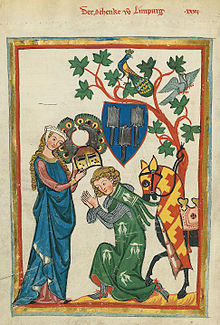Kekesatriaan
(Dialihkan dari Kode kekesatriaan)
Kekesatriaan, atau kode kekesatriaan, adalah kode etik informal dan beragam yang berkembang antara 1170 dan 1220, yang tak pernah diputuskan atau dijelaskan dalam sebuah dokumen tunggal, yang diasosiasikan dengan institusi abad pertengahan dari sifat kesatria; perilaku kesatria dan wanita tangguh diatur oleh kode sosial kekesatriaan.[1] Gagasan kekesatriaan dipopulerisasikan dalam sastra abad pertengahan, khususnya Matter of Britain dan Matter of France. Matter of Britain berdasarkan pada Historia Regum Britanniae karya Geoffrey dari Monmouth yang memperkenalkan legenda Raja Arthur, yang ditulis pada 1130an.[2] Semua karya tersebut dianggap sebagai catatan sejarah yang akurat sampai permulaan pembelajaran modern.

Catatan
suntingReferensi
sunting- ^ HOLT Literature & Language Arts. Houston, Texas: Holt, Rinehart, and Winston. 2003. hlm. 100- 101. ISBN 0-03-056498-0.
- ^ Keen, Maurice Hugh (2005). Chivalry. Yale University Press. hlm. 102.
Daftar pustaka
sunting- Anonymous (1994). The World Book Encyclopedia. World Book. ISBN 0-7166-0094-3.
- Bromiley, Geoffrey W. (1994). International Standard Bible Encyclopedia: K–P. ISBN 0-8028-3783-2.
- Corrêa de Oliveira, Plinio (1993). Nobility and Analogous Traditional Elites in the Allocutions of Pius XII. ISBN 0-8191-9310-0.
- Crouch, David (2005). The Birth of Nobility: Constructing Aristocracy in England and France 900–1300. Harlow, UK: Pearson. ISBN 0-582-36981-9.
- Felson, Richard B. (2002). "Violence and gender reexamined". Law and public policy. Washington, DC: American Psychological Association. hlm. 67–82.
- Flori, Jean (1998). La Chevalerie. J. P. Gisserot. ISBN 2877473457.
- Gautier, Léon (1891). Chivalry. translated by Henry Frith.
- Gravett, Christopher (2008). Knight: Noble Warrior of England 1200–1600. Oxford: Osprey Publishing.
- Hoad, T. F. Hoad (1993). The Concise Oxford Dictionary of English Etymology. Oxford University Press.
- Hodges, Kenneth (2005). Forging Chivalric Communities in Malory's Le Morte Darthur. New York: Palgrave Macmillan.
- Huizinga, Johan (1924) [1919]. The Autumn of the Middle Ages.
- Keen, Maurice Keen (2005). Chivalry. New Haven, CT: Yale University Press.
- Manchester, William R. (1978). American Caesar: Douglas MacArthur 1880-1964. Boston & Toronto: Little, Brown and Company.
- Oakeshott, R. E. (1980). European Weapons and Armour: from the Renaissance to the Industrial Revolution.
- Sweeney, James Ross (1983). "Chivalry". Dictionary of the Middle Ages. III. hlm. [halaman dibutuhkan].
- Tucker, Ruth (1987). Daughters of the Church. ISBN 0-310-45741-6.
- Wilkins, Christopher (2010). The Last Knight Errant: Sir Edward Woodville and the Age of Chivalry. London & New York: I. B. Tauris.
Bacaan tambahan
sunting- Alexander, Michael. (2007) Medievalism: The Middle Ages in Modern England, Yale University Press. Alexander rejects the idea that medievalism, a pervasive cultural movement in the nineteenth and early twentieth centuries, was confined to the Victorian period and argues against the suspicion that it was by its nature escapist.
- Davis, Alex (2004). Chivalry and Romance in the English Renaissance. Woodcock, Matthew.
- Barber, Richard (1980). "The Reign of Chivalry".
- Bouchard, Constance Brittain (1998). Strong of Body, Brave and Noble: Chivalry and Society in Medieval France. Cornell University Press, 1998. ISBN 0-8014-8548-7
- Charny, Geoffroi de, died 1356 (2005). A Knight's Own Book of Chivalry (The Middle Ages Series). Translated by Eslpeth Kennedy. Edited and with a historical introduction by Richard W. Kaeuper. University of Pennsylvania Press. Celebrated treatise on knighthood by Geoffroi de Charny (1304?-56), considered by his contemporaries the quintessential knight of his age. He was killed during the Hundred Years War at the Battle of Poitiers.
- Gautier, Léon, (1895) (1883, 3rd ed. 1895| La Chevalerie)
- Girouard, Mark (1981). The Return to Camelot: Chivalry and the English Gentleman. Yale University Press.
- Haines, Charles Reginald. (1889). Christianity and Islam in Spain, A.D. 756-1031. London: Kegan Paul, Trench & Co. Project Guttnberg online book.
- Prestage, Edgar (1928). "Chivalry: A Series of Studies to Illustrate Its Historical Significance and Civilizing Influence".
- Kaeuper, Richard W. (1999). Chivalry and Violence in Medieval Europe. Oxford University Press, 1999.
- Kaeuper, Richard W. (2009) Holy Warriors: The Religious Ideology of Chivalry (The Middle Ages Series). University of Pennsylvania Press. Foremost scholar of chivalry argues that knights proclaimed the validity of their bloody profession by selectively appropriating religious ideals.
- Keen, Maurice (1984). Chivalry. Yale University Press. ISBN 0-300-03150-5 / ISBN 0-300-10767-6 (2005 reprint).
- Mills, Charles (2004). "The History of Chivalry or knighthood and its Times" Volume I-II.
- Read, Charles Anderson (2007). The Cabinet Of Irish Literature; Selections From The Works Of The Chief Poets, Orators, And Prose Writers Of Ireland - Vol IV (Paperback).
- Saul, Nigel. (2011) Chivalry in Medieval England. Harvard University Press. Explores chivalry's role in English history from the Norman Conquest to Henry VII's victory at Bosworth in the War of the Roses.
Pranala luar
sunting- Laura Ashe (University of Oxford), Miri Rubin (University of London), and Matthew Strickland (University of Glasgow), interviewed by Melvin Bragg, "Chivalry", In Our Time, BBC Radio 4 (February 13, 2014). Includes bibliography for further reading. Downloadable podcast available.
- "Chivalry", Old Catholic Encyclopedia, 1914.
- "Chivalry", Encyclopædia Britannica, full-article, newest edition.
- "Chivalry during the Reign of Edward III", from Shadow Realms.
- "Medieval Chivalry".
- "Spatial Dichotomy in the Medieval Chivalry Romance ( City / forest ) Elbakidze, M.V."
- The Art of Chivalry: European arms and armor from the Metropolitan Museum of Art: an exhibition, Issued in connection with a 1982 exhibition at The Metropolitan Museum of Art
- "Chivalry". Encyclopædia Britannica. 6 (edisi ke-11). 1911. hlm. 253.
Wikimedia Commons memiliki media mengenai Knights.